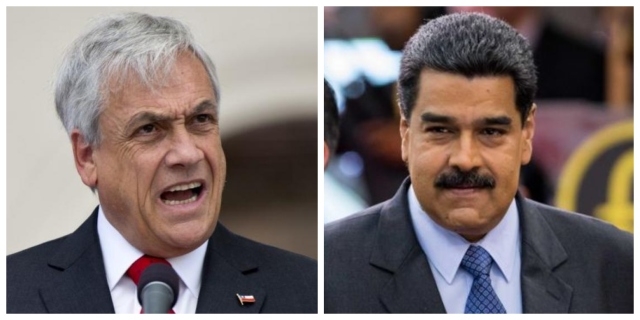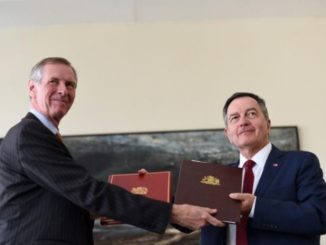
SANTIAGO – Chilean President Sebastián Piñera has said his government does not recognize the legitimacy of Venezuelan President Nicolás Maduro’s regime.
“The Chilean government does not recognize the political regime of Nicolás Maduro in Venezuela,” Piñera said in a statement, in which he assured that Maduro came to power “illegitimately, after an election that did not meet the minimum transparency requirements.”
Chile no reconoce el régimen ilegítimo de Maduro en Venezuela. Entregamos nuestro absoluto respaldo a la Asamblea Nacional e instamos a Maduro a transferirle de forma provisional el Poder Ejecutivo para q convoque pronto nuevas elecciones democráticas, libres y transparentes. pic.twitter.com/plfXLgN65k
— Sebastian Piñera (@sebastianpinera) January 10, 2019
On Thursday, Maduro was sworn in for his second presidential term that will last through 2025.
Chilean Foreign Minister Roberto Ampuero said in a statement: “We do not recognize this government which came to power today because it is the continuation of the rule of Nicolas Maduro, whom we all know.”
“El @GobiernodeChile no reconoce al régimen político de Nicolás Maduro en Venezuela”
Comunicado de Prensa del Presidente @sebastianpinera pic.twitter.com/CPlI1jw3Pk
— Prensa Presidencia de Chile (@presidencia_cl) January 10, 2019
The letter signed by President Piñera added that “we request respect for the integrity, autonomy and independence of the Supreme Court of Justice, which was legitimately formed and today is a way to recover the rule of law in Venezuela.”
In addition, the Government assured to deliver its “absolute support to the National Assembly, democratically elected on December 6, 2015 and to its newly assumed president, Juan Guaidó, and we urge Nicolás Maduro to temporarily transfer the Executive Power to the National Assembly so that new presidential elections can be held soon according to international standards.”
It also demands that mechanisms be established to allow access to humanitarian aid to help address this serious and critical situation and prevent more Venezuelans from dying of hunger or lack of medication.
At a meeting in Lima last week, the Lima Group of Latin American countries plus Canada urged Maduro to refrain from taking the presidential oath.
Similarly, the Organization of American States (OAS) said in a statement that it did not recognize the legitimacy of Maduro’s new term and reiterated its “deep concern” about the deteriorating political, economic, social and humanitarian crisis in Venezuela.
#OAS Permanent Council Agrees "to not recognize the legitimacy of @NicolasMaduro's new term" #OEAconVzla #Venezuela
? https://t.co/5l5CZoNBzu
? https://t.co/tO0hycz1rd
? https://t.co/ggtY31aqVh pic.twitter.com/L9gF0d2O6R— OAS (@OAS_official) January 10, 2019
The group argued that this situation in Venezuela resulted from “the breakdown of democratic order and serious human rights violations in that state, and the government of Venezuela’s negligence to meet the fundamental Inter-American standards of human rights and democracy.”
Since 2015, Venezuela has been embroiled in a worsening economic crisis with hyperinflation soaring and millions of people fleeing food and medicine shortages.



